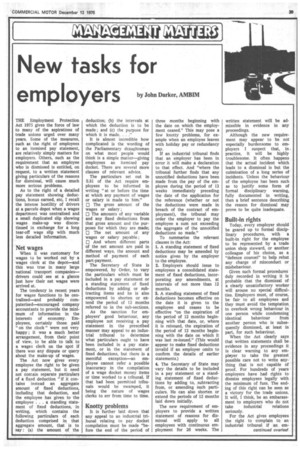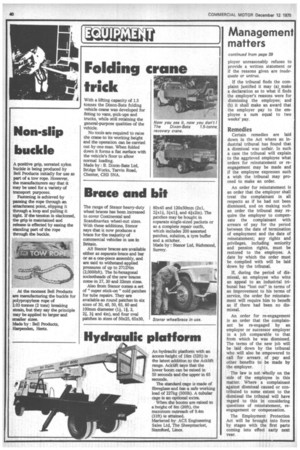New tasks for
Page 43

Page 44

If you've noticed an error in this article please click here to report it so we can fix it.
employersby John Darker, AMBIM THE Employment Protection Act 1975 gives the force of law to many of the aspirations of trade unions urged over many years. Some of the measures, such as the right of employees to an itemised pay statement, are relatively simply matters fot employers. Others, such as the requirement that an employee who is dismissed is entitled, on request, to a written statement giving particulars of the reasons for dismissal, will cause much more serious problems.
As to the right of a detailed pay statement showing deductions, bonus earned, etc, I recall the intense hostility of drivers at a parcels depot when a wages department was centralised and a small duplicated slip showing wages make-up was discontinued in exchange for a long tear-off wage slip with much less detailed information.
Net wages
When it was customary for wages to be worked out by a wages clerk at the depot—and this was true in many large national transport companies— drivers could see at a glance just how their net wages were arrived at.
The tendency in recent years for wages functions to be centralised—and probably computerised—encouraged company accountants to provide the minimum of information in the interests of economy. Employees, certainly those paid "on the clock" were not very happy ; it was a much better arrangement, from their point of view, to be able to talk to a wages clerk on the spot if there was any dispute or query about the make-up of wages.
The Act now gives every employee the right to be given a pay statement, but it need not contain separate particulars of a fixed deduction "if it contains instead an aggregate amount of fixed deductions, including that deduction, and the employee has given to the employee . . . a standing statement of fixed deductions, in writing, which contains the following particulars of each deduction comprised in that aggregate amount, that is to say : (a) the amount of the deduction; (b) the intervals at which the deduction is to be made ; and (c) the purpose for which it is made. ."
It is almost incredible how complicated is the wording of the Parliamentary draughtsman on what most people would think is a simple matter—giving employees an itemised pay docket. There are several more clauses of relevant advice.
The particulars set out in S.81 of the Act require employees to be informed in writing " at or before the time at which any payment of wages or salary is made to him."
El The gross amount of the wages or salary ; O The amounts of any variable and any fixed deductions from that gross amount and the purposes for which they are made; o The net amount of any wages or salary payable ; O And where different parts of the net amount are paid in different ways, the amount and method of payment of each part-payment.
The Secretary of State is empowered, by Order, to vary the particulars which must be included in a pay statement or a standing statement of fixed deductions by adding or subtracting items and he is also empowered to shorten or extend the period of 12 months referred to in the sub-sections.
As the sanction for employers' good behaviour, any employee not receiving a pay statement in the prescribed manner may appeal to an industrial tribunal to determine what particulars ought to have been included in a pay statement, or in the statement of fixed deductions, but there is a merciful exception—an employee cannot refer a possible inaccuracy in the compilation of a wage docket money items or time worked to a tribunal. If that had been permitted tribunals would be swamped, it being the nature of wages clerks to err from time to time.
Knotty problems
It is further laid down that any appeal to an industrial tribunal relating to pay docket compilation must be made "before the end of the period of three months beginning with the date on which the employment ceased." This may pose a few knotty problems, for example when an employee leaves with holiday pay or redundancy pay.
If an industrial tribunal finds that an employer has been in error it will make a declaration to that effect. And "where the tribunal further finds that any unnotified deductions have been made from the pay of the employee during the period of 13 weeks immediately preceding the date of the application for the reference (whether or not the deductions were made in breach of the contract of employment), the tribunal may order the employer to pay the employee a sum not exceeding the aggregate of the unnotified deductions so made."
To summarise the relevant clauses in the Act: I. A standing statement of fixed deductions may be amended by notice given by the employer to the employee.
2. Employers should issue to employees a consolidated statement of fixed deductions, incorporating any amendments, at intervals of not more than 12 months.
3. A standing statement of fixed deductions becomes effective on the date it is given to the employee and ceases to be effective "on the expiration of the period of 12 months beginning with that date, or, where it is reissued, the expiration of the period of 12 months beginning with the date on which it was last re-issued." (This would appear to make fixed deductions invalid if an employer omits to confirm the details of earlier statements.) 4. The Secretary of State may vary the details to be included in a pay statement or a standing statement of fixed deductions by adding to, subtracting from, or amending such particulars. He can also shorten or extend the periods of 12 months laid down initially.
The new requirement of employers to provide a written statement of reasons for dismissal will apply to all employees with continuous employment for 26 weeks. The written statement will be admissible in evidence in any proceedings.
Although the new requirement may appear to be not especially burdensome to employers I suspect that, in practice, it will be highly troublesome. It often happens that the actual incident which leads to a dismissal is but the culmination of a long series of incidents. Unless the behaviour of the employee has been such as to justify some form of formal disciplinary warning, fully documented in writing, then a brief sentence describing the reason for dismissal may prove to be quite inadequate.
Built-in rights
Today, every employer should be geared up to formal disciplinary procedures, with a built-in right for the employee to be represented by a trade union shop steward, or another colleague of his choice, as a "defence counsel" to help rebut any charge of misconduct or misbehaviour.
Given such formal procedures duly recorded in writing it is probable that the dismissal of a clearly unsatisfactory worker will arouse no special difficulties. Employers must, of course, be fair to all employees and they must avoid the temptation to overlook wrong behaviour in one person while condemning identical behaviour from another person who is subsequently dismissed, at least in part, for such behaviour.
When the Act clearly says that written statements shall be evidence in any proceedings it is clear warning to any emplayer to take the greatest possible care not to write anything that is not capable of proof. For hundreds of years employers have had rights to dismiss employees legally with the minimum of fuss. The ending of this right can be seen as a victory for the trade unions. It will, I think, be an embarassmerit to employers who do not take industrial relations seriously.
For the Act gives employees the right to complain to an industrial tribunal if an emcontinued overleaf ployer unreasonably refuses to provide a written statement or if the reasons given are inadequate or untrue.
If the tribunal finds the complaint justified it may (a). make a declaration as to what it finds the employer's reasons were for dismissing the employee; and (h) it shall make an award that the employer pay to the employee a sum equal to two weeks' pay.
Remedies
Certain remedies are laid down in the Act where an industrial tribunal has found that a dismissal was unfair. In such a case the tribunal will explain to the aggrieved employee what orders for reinstatement or reengagement may be made and if the employee expresses such a wish the tribunal may proceed to make an order.
An order for reinstatement is an order that the employer shall treat the complainant in all respects as if he had not been dismissed, and on making such an order the tribunal may require the employer to compensate the complainant with arrears of pay for the period between the date of termination of employment and the date of reinstatement; any rights and privileges, including seniority and pension rights, must be restored to the employee. A date by which the order must be complied with will be laid down by the tribunal.
If, during the period of dismissal, an employee who wins an appeal to an industrial tribunal has "lost out" in terms of an improvement to his terms of service, the order for reinstatement will require him to benefit as if there had been no dismissal.
An order for re-engagement is an order that the complainant be re-engaged by an employer or successor employer in a job comparable to that from which he was dismissed. The terms of the new job will be laid down by the tribunal who will also be empowered to call for arrears of pay and other benefits to be made by the employer.
The taw is not wholly on the side of the employee in this matter. Where a complainant against dismissal caused or contributed to some extent to the dismissal the tribunal will have regard to this in considering questions of reinstatement, reengagement or compensation.
The Employment Protection Act will be brought into force by stages with the first parts coming into effect early next year,














































































